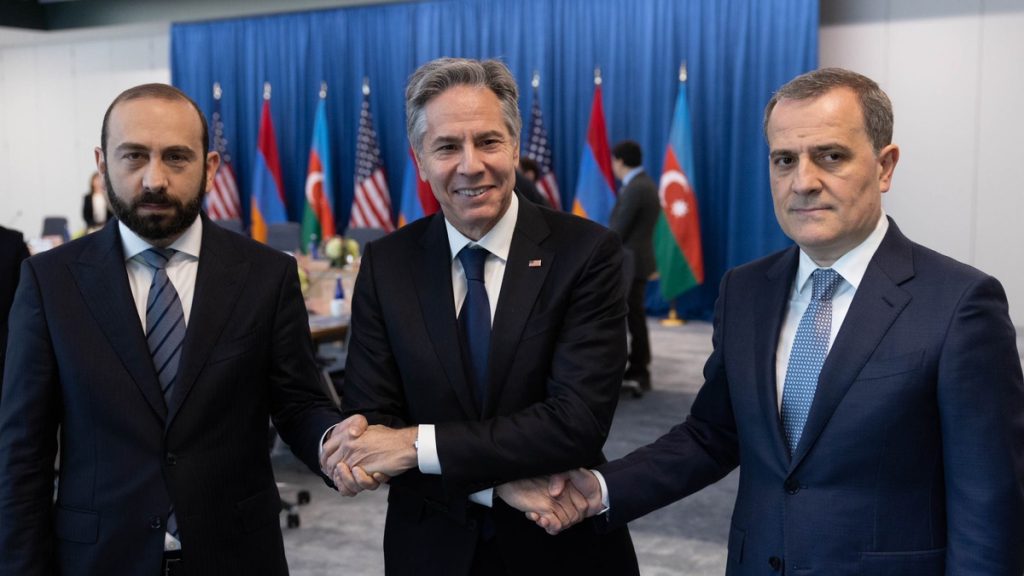While Russia remains bogged down in Ukraine, the United States seeks to increase its influence in the South Caucasus – a region that has traditionally been in Moscow’s geopolitical orbit. This week the US hosted negotiations between Armenia and Azerbaijan, seeking to quell recent tension over Nagorno-Karabakh that threatens to once again destabilize the turbulent region.
On April 23 Azerbaijan announced it had set up a checkpoint on the Lachin corridor, the only land link between Armenia and Nagorno-Karabakh – a mountainous region internationally recognized as part of Azerbaijan, although it has been under the Armenian control for three decades. Such an action marked the end of the months-long Azerbaijani blockade of the transportation route. But even though the energy rich Caucasus nation restored control over its entire border with Armenia, that does not necessarily mean that the transportation network in Nagorno-Karabakh will remain passable.
On May 2, Karabakh Armenians set up tents on the Stepanakert-Shusha road and launched an indefinite protest, demanding Azerbaijan to remove the checkpoint. In other words, the Armenians are now attempting to use Azerbaijani strategy hoping to achieve their goals by blocking the road. But given that Armenia’s Prime Minister Nikol Pashinyan recently stressed that his country “fully recognizes territorial integrity of Azerbaijan”, and that not a single major global actor condemned Baku’s actions on the Lachin corridor, it is extremely unlikely that Azerbaijani military will remove the checkpoint.
The US Secretary of State Antony Blinken expressed Washington’s “deep concern” that Azerbaijan’s establishment of a checkpoint on the Lachin corridor “undermines efforts to establish confidence in the peace process”. Such a statement perfectly illustrates that Baku got at least a tacit approval from the US to restore control over its border with Armenia. More importantly, the very fact that the Russian peacekeepers – who have been deployed to Nagorno-Karabakh following the 44-day war Armenia and Azerbaijan fought in 2020 – did not even attempt to prevent Azerbaijan from setting up a checkpoint, suggests that Moscow also indirectly greenlit Baku’s actions.
Thus, Karabakh Armenians seem to be on their own. Now that Azerbaijan effectively controls the entrance to Nagorno-Karabakh, Armenia will no longer be in a position to supply the self-proclaimed Republic of Artsakh (Artsakh being the Armenian name for Nagorno-Karabakh) with weapons. Moreover, in order to cross the border, Baku may eventually require the local Armenians to get Azerbaijani passports, which will be the first step in a long-term process of their integration into Azerbaijani society.
Meanwhile, the US will likely attempt to benefit from the tense situation in the region, and start playing the role of a major mediator in the decades-old conflict between the two former Soviet republics. At this point, it is not very probable that Armenian and Azerbaijani leaders will sign a potential US-brokered peace deal in the near future, although Washington will undoubtedly pressure Yerevan and Baku “normalize relations” as soon as possible. But how will that affect Russia’s positions in the South Caucasus?
For the Kremlin, “there is no alternative” to a deal that Moscow signed with the two warring countries in 2020. Even though the Russian-brokered ceasefire agreement effectively ended the Second Karabakh War, to this day border clashes between Azerbaijan and Armenia remain a norm. Since Moscow, following several Azerbaijan’s incursions into Armenian territory, refused to protect its ally Armenia, anti-Russian sentiment in the landlocked country of around three million people started to grow.
That, however, does not man that Armenia will leave the Russian-dominated Collective Security Treaty Organization anytime soon, although Yerevan will likely seek to establish close ties with the West, as well as with Iran, hoping that such a strategy will help the former Soviet republic protect its national interests. As a result, Russia will continue losing its influence in the region. Washington, for its part, is “optimistic that peace and stability between Armenia and Azerbaijan can be achieved”. But in order to reach a peace deal, Baku is expected to pressure Yerevan to build its section of the Nakhchivan corridor (also known as Zangezur corridor) – linking mainland Azerbaijan with its exclave of Nakhchivan through Armenian territory – with no passport or customs controls.
Since Armenia has de facto given up its aspirations to preserve control over Nagorno-Karabakh, it has lost the last trump-card it could have used against Azerbaijan. Once Baku resolves the Karabakh issue in its favor – one way or another – Yerevan will be forced to make new concessions to its neighbor. After the Lachin corridor crisis is over, the Nakhchivan corridor crisis will break out, and Armenia will have a hard time preserving its sovereignty in the southernmost province of Syunik, where the new transportation route is expected to be built.
In order to prevent such an outcome, Yerevan will continue distancing itself from the Kremlin, and attempting to develop close ties with Washington, although there is no guarantee that the United States – even if it manages to eventually crowd Russia out of the Caucasus – will ever take a pro-Armenian stance and turn its back on energy-rich Azerbaijan.

